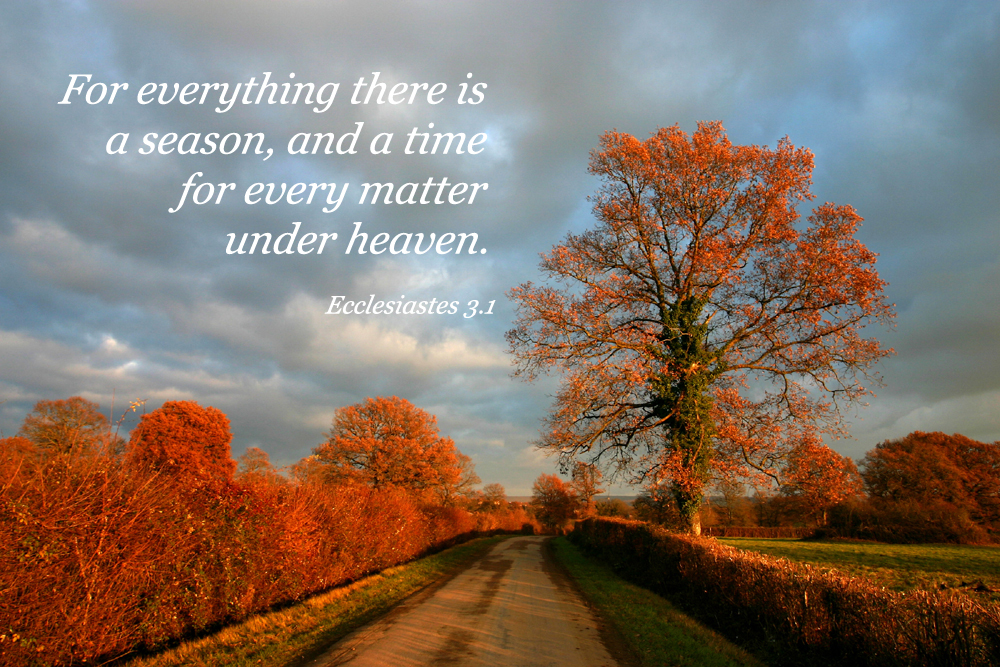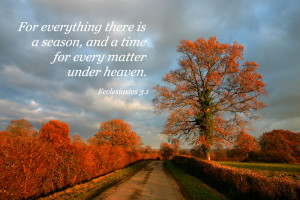Seasons
Devotions for Ecclesiastes 3:1-17
Monday–Seasons
“For everything there is a season” (Ecclesiastes 3:1a).
People in Minnesota and Wisconsin enjoy four distinct seasons. There’s spring when the snow melts, trees bud and flowers start to peek out of the ground. Summer follows with its warm days, green grass and time spent by a lake. Fall brings the shimmering color palate of forest trees and the nip of frost, while winter follows with white snow, fires in the fireplace and hot cocoa. Others who live in the Southwest United states enjoy one season of dry and very hot and a second season of not-so-hot with a little rain.
Seasons are something that we have absolutely no control over. We can’t speed them up or slow them down. We can complain about them—the humidity of Midwest summers and the bitter cold of the winters, or the heat, wind and storms of the Monsoon season. When we complain the seasons drag on, nothing changes and we are miserable.
The secret of living in seasons is to acknowledge our lack of control and to look for the unique, good elements of the season:
• Snowmobiling and skiing in the winter, picking pumpkins and walking in the woods during the fall.
• Beat the heat with a dip in the pool or sit around a fire pit with friends on a brisk winter evening in the desert.
The ebb and flow of our daily lives are much like the seasons of the year. They are gifts meant to be experienced—sometimes enjoyed and sometimes endured. No matter when or where we live out the seasons, God is always present.
God of creation, thank you for the wonder of your creation. Teach us to experience and savor both the seasons of creation and the seasons of our lives. Amen.
Tuesday–Seasons
“A time to plant and a time to pluck up what is planted” (Ecclesiastes 3:2b)
Urban life has robbed us of the experience of planting and reaping—of waiting and hoping. Sue went to the supermarket to purchase mangoes, papayas and kiwis for a refreshing dessert she wanted to prepare for her dinner guests. She became angry when the store didn’t have any papayas or mangoes. They were out of season. The kiwis, though available, didn’t look very good. Sue was accustomed to purchasing whatever she needed whenever she needed it without any thought as to how the food became available.
Sue’s experience was vastly different from Jim Connor’s. Jim was a North Dakota wheat farmer. He planted his crop in late April or early May and watched the plants poke out of the rich soil. He prayed for rain and sunshine, while he prepared the machinery for the harvest in August and September. All the time Jim waited expectantly hoping for a bumper crop.
Our daily lives are usually more like Jim’s than Sue’s. Many times we find ourselves planting and waiting. It is difficult because we are not used to it and we are impatient. We cannot condense the time, though, between planting and reaping. We can only live each day expectantly, hoping that the God of creation will bring new life from our plantings.
God of Life, forgive us for our impatience. Help us to learn how to wait, resting in you and trusting that you will bring forth an abundant harvest. Amen.
Wednesday–Seasons
“A time to mourn and a time to dance” (Ecclesiastes 3:4b).
Loss and the mourning that accompanies our losses are a part of life. We usually think that death of a loved one is the main cause of our mourning. Loss, however, comes in many shapes and sizes. A retiree may mourn the loss of a pain-free walk in the park. A grade school student may mourn the loss of close friends as she advances to middle school. Parents may mourn the loss of their toddler when he climbs aboard a school bus for his first day of kindergarten.
Sometimes we focus on our losses. We run them over and over in our minds. Anger builds at the changes that they force us to make, the pain they bring with them or the fear of the unknown that is present. We may become stuck in our grief; unable to experience the present or hope in the future.
Still we have a promise. Our time of mourning will change into a time to dance. We won’t forget our loss, but we will be able to celebrate the gift of life. We will also be able to give thanks to the Lord whose tears have mixed with ours during our mourning and who now dances with us in the celebration.
Ever present Lord thank you for not deserting us during our times of grief and for joining us in our celebrations. Amen.
Thursday–Seasons
“A time to keep and a time to throw away” (Ecclesiastes 3:6).
Linda Ramos, her husband Juan and their three children had to move. Linda had been given a promotion to a position in a different city. It was a difficult move for the family. They had lived in the house for fifteen years. The move was, though, one they all agreed was for the best. As moving day approached, the Ramos’ went through their belongings sorting out what they wanted to take with them and what they wanted to throw out. Linda was amazed at the amount of stuff they had accumulated throughout the years. Several trips were made to their denomination‘s local thrift store.
Once they were settled in their new home they had a family meeting. Linda shared her discomfort over the amount of stuff the family had stored away and eventually gave away. Together the family decided that they would work to cut down the amount of purchases they made seeking to limit them to what they needed rather than what they wanted. They also decided that they would only purchase clothing to replace worn or outgrown clothing. The Ramos’ had focused on “a time to keep”. Now, they were going to concentrate on “a time to throw [give] away.”
We may not be hoarders, but most of us have stuff we keep but never use. We also purchase things we don’t really need and soon put away in a closet. There are many people in need in the world today. Now may be the time to go through our belongings and determine what needs to be kept and what needs to be given away. We can give God thanks for the abundance we enjoy while sharing that abundance with others.
Generous God, it is so easy for us to think our desires are needs and to spend our time and money on ourselves rather than on others. Forgive us and give us the desire and the ability to follow your example of generosity. Amen.
Friday–Seasons
There is nothing better for them to be happy and enjoy themselves as long as they live” (Ecclesiastes 3: 12).
The writer of Ecclesiastes certainly isn’t in agreement with what many Christians would put in the “nothing better” category. Many Christians today would say that there is nothing better than to have Jesus as your personal Lord and Savior and to know that you will go to heaven when you die. Today the focus seems to be on the next life, while the writer to Ecclesiastes wanted to focus on this life.
The writer to Ecclesiastes is silent when it comes to heaven and hell, and life after death. That’s probably understandable because these were not concepts that were developed when Ecclesiastes was written. The words of Ecclesiastes, though, challenges us to focus our attention on the present—both our enjoyment of it and the enjoyment of others.
Yep, there is going to be hard times and our goal in life is not to escape them. That will not bring happiness. Happiness is found in contentment and in acknowledging all of life is a gift. It is found in community and in finding meaningful ways to use our talents and abilities in the love of God and in service to others. Happiness is a life of gratitude that is lived with a thankful heart. Now is the time to be happy.
Patient God, You have blessed us with so much for which to be thankful. Help us to savor, enjoy and rejoice in your gifts of life, work, family and friends. Amen.
Saturday–Seasons
“I saw under the sun that in the place of justice, wickedness was there” (Ecclesiastes 3:16).
Carter loved his lawn and he spent a great deal of time and money-making sure it was in immaculate condition. He fertilized regularly, dethatched and aerated. Yet, no matter how hard he tried, he couldn’t keep out the weeds. Dandelions would pop up unexpectedly. Creeping Charlie would invade the lawn from its edges. Mysteriously crab grass and quack grass would appear. Carter acted quickly when weeds or pests appeared. He knew that if he neglected them they would soon take over his lawn.
Wickedness, injustice and conflict creep into God’s wonderful creation—and into our lives. To stand against these “weeds” sometimes seems to be fruitless and even hopeless. Still, what is our alternative? If we don’t strive for justice, stand against wickedness and live as peacemakers—unmindful of the cost—who will? The cost of our apathy and inaction is a world ruled by wickedness rather than righteousness and where injustice instead of justice is the norm. As disciples of Jesus Christ we have not been called to peaceful coexistence, but rather to “Lift High the Cross,” as we strive for righteousness, justice and peace.
Righteous Lord, wickedness seeks to overthrow the goodness of your creation. As your people, righteous because of Jesus’ life, death and resurrection, empower us to live righteously and boldly stand against wickedness and its ilk. Amen.
Sunday–Seasons
“God will judge the righteous and the wicked for he has appointed a time for every matter” (Ecclesiastes 4:17).
Obadiah Cleaver sat in the shade of his porch listening to the cicadas and reflecting on his long life. His grandfather had been a slave who had been set free after the Civil War. His father and family had been tenant farmers, which was only a step or two away from slavery. Obadiah had lived through the years of Jim Crow, and through the Civil Rights struggle in the 60’s. He’d marched in a few demonstrations himself. The first year he voted was in 1968. His life and that of his family had improved, but there still needed to be some changes deep in the hearts of people. Today when he viewed the evening news, Obadiah realized that society’s views were changing again and other groups like the gays, lesbians, Latinos and women were making their cry for freedom and equality heard.
The wickedness of prejudice, bigotry and inequality was being identified. A person didn’t need to wait to be in that great celestial courtroom where the wicked and the righteous would be judged. Judgement was now. People knew what was right and what was wrong, but the line between right and wrong was changing—it was always changing. God’s Spirit moved and shed new light on accepted, hidden or forgotten wickedness. A person needed to be aware of how the Spirit was moving. Obadiah nodded, he even had to change the way he judged right and wrong in his views of gays and lesbians and in the treatment of women. A thin smile came to his lips as Obadiah remembered the excitement of participating a few weeks ago in a gay rights parade celebrating the Supreme Court’s decision on same sex marriage. Judgment had been made and the endless fight between righteousness and wickedness continued.
Almighty God, Open our eyes that we may see the wickedness in our own hearts and in the world around us. Grant us strength and courage to live righteously and join the struggles against wickedness. Amen.


